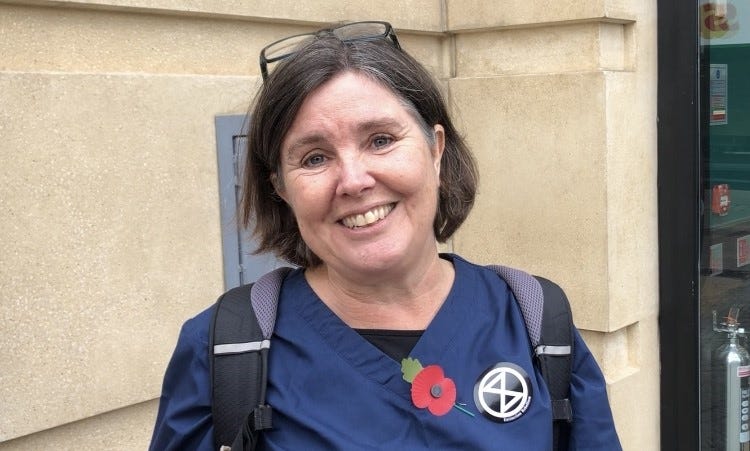20 NOVEMBER 2023 | FEATURE
Health professionals across the NHS lay bare the realities of working on the frontline. Amid a wave of industrial action this year, deteriorating morale and staff shortages, key workers’ first-hand accounts detail a health service at “breaking point”.
In an unprecedented age of heightened demand and scarce resources, the NHS is being put under increasing pressure – and it is the key workers on the frontline who are bearing the brunt of the strain.
Strikes have forced thousands of appointments and operations to be postponed. Funding cuts to public services, brought on by austerity, have resulted in a continual slash to the NHS budget and real-terms pay cuts for key workers. Meanwhile, there are fewer GPs and more patients compared to previous years, which has forced demand up.
These challenges have been brought to a head by the coronavirus pandemic – but whilst politicians say the health service is “on its knees”, one King’s Fund policy adviser explains that there is “no answering call to the problems the NHS is facing”. From the doctors’ surgeries to the hospital wards, these are the untold stories of key workers on the frontline.
‘I loved being a doctor, and at the end I hated it’
Dr Anne Wilson is a former GP partner from Hampshire who took early retirement after the pandemic. The increasing strain on general practice, which was brought on to a large extent by coronavirus, pushed her to the point that she questioned why she continued to work in the health service.
Mounting pressures on primary care and her own mental health led her to feel that “I just can’t do it anymore”. By the time Dr Wilson took the decision to retire, she described herself as being at “breaking point”.

“I felt that I couldn’t go on any longer and that all my resilience had just been drained away and sapped out of me and that I couldn’t do the job anymore,” she explains, adding that the stress of running a GP surgery was making her unwell.
“I thought ‘why am I doing this? Why am I making myself feel ill’ because of what was a job which I really, really loved? I loved being a doctor, and at the end I hated it.”
‘We’ve been papering over the cracks and now we’re at breaking point’
Increasing demand has caused staff morale to plummet across primary care, and GP surgeries are feeling the burden.
Dr Andy Purbrick, a Dorset-based GP and Joint Chief Executive of Wessex Local Medical Committees, shares Dr Wilson’s sentiments. He says he has never seen such low staff morale and that delivering quality care is a “challenge”, given the increasing demand on general practice.
“We’ve been papering over the cracks and the cracks are now so big that we don’t have enough paper to paper over them, and I think the NHS is at breaking point,” Dr Purbrick said.
“I’ve worked as a GP for 23 years and I’ve never known the job to be so busy and so difficult to deliver. Just delivering good healthcare on a daily basis feels like a challenge, let alone gold standard healthcare.”
He adds that “I’m seeing morale at the lowest it’s ever been” as exacerbating demand and patient expectation is taking its toll on staff on the frontline.
The GP says it isn’t surprising that doctors’ surgeries are struggling to offer appointments to all the patients who need one. Having “less doctors and more patients” is having a severe impact on the capacity to deliver healthcare, and with GPs working 12 or 13-hour days to stay on top of the workload they’re experiencing “burnout”.
Dr Purbrick explains: “We’ve got 2078 fewer fully qualified GPs than we had in 2015. At the same time, each GP has 2283 patients to care for, which is 18 per cent more than they had in 2015.”
Figures published by GPonline in June 2022 showed that between 2013 and 2022 the average number of patients per GP surgery in England had risen by 37 per cent, whilst in the same period the total number of practices had dropped by 20 per cent, which offers an explanation as to why demand in primary care has skyrocketed in recent years.
It is therefore unsurprising that people are struggling to gain access to their GPs – and the pandemic is also partly to blame. Because many patients had put off addressing their health needs for two years, they are now presenting to their doctors with several health issues or concerns, Dr Wilson and Dr Purbrick agree, which has had a severe impact on primary care’s ability to cater to demand.
The King’s Fund’s latest annual patient survey published in March shows that discontent with the NHS has hit an all-time low with 51 per cent of respondents saying they were dissatisfied with the health service – the highest proportion since the survey began.
The think tank’s figures also revealed that of these respondents, 69 per cent said their main reason for dissatisfaction was waiting times for GP and A&E appointments. But the issues that both Dr Wilson and Dr Purbrick highlight are not unique to general practice.
‘Nurses are literally being brought to tears’
Hospitals across the country are also facing unprecedented challenges, from corridors being used as “makeshift” wards to “unsafe” levels of staff – and low morale is also affecting key workers in secondary care.
Beth Taylor* is a student paediatric nurse at Royal Derby Hospital in Derbyshire. She highlights that levels of staff are so poor on the wards that the nurse to patient ratio has reached levels deemed “unsafe” by guidelines.
She says: “Children’s wards should be staffed at one nurse for every four patients, but there are shifts I have been on where there has been only one nurse to take care of 16 patients. Nurses are literally being brought to tears because they feel that they can’t do their best.”
Having supported the nurses’ strikes earlier this year, the student nurse argues that standing on the picket line is just as much about improving conditions as it is about pay increases, and that the worsening situation on the wards has led to colleagues going sick with stress as a result of work-related mental health issues.

“Healthcare professionals are some of the most important people in society, but are also some of the most underappreciated,” Beth adds.
With staffing levels and resources continually being stretched, it is clear how the frontline has taken its toll on the nurses who took to the picket line at the beginning of 2023. It also explains why the UK has seen a drop in applications for nursing degrees in the last year.
In February, UCAS published figures showing that nursing applications declined by 18.5 per cent for this academic year (2023-24), with 7,600 fewer people choosing to study nursing in comparison to the same time in 2022.
‘Junior doctors’ strikes set waiting lists back by at least six months’
Although key workers have made their case clear for taking industrial action, strikes across the health sector are having a significant impact not just on patients, but the health service itself.
The junior doctors’ strikes in March and April resulted in hospitals across the country having to cancel thousands of appointments and operations for patients who could have already been on waiting lists for up to a year.
With a lack of staff to man the wards, consultants volunteered to get back on the frontline working “day and night” in an attempt to control the damage. But one clinician predicted earlier this year that backlogs could be pushed back by another six months owing to industrial action.
Dr Helena Clements is a paediatric consultant and medical manager at King’s Mill Hospital in Nottinghamshire. She describes how the strikes resulted in hundreds of operations having to be cancelled at the hospital, adding that the junior doctors’ strikes will have a severe impact for months to come.
The consultant says: “It took weeks and weeks of planning because of the impact of losing our junior doctors. Everything was cancelled.
“Several hundred operations didn’t get done which have to be done at some other point. Consultants cancelled all of that work and instead worked on the wards as if they were junior doctors, and that meant working day and night,” she continued.
“But we pulled it off because we didn’t have a choice – we couldn’t say ‘we’re not doing that’. For the junior doctors’ strikes in March and April [there was] probably six months’ work to catch up again.”
Dr Clements adds that the hospital is “sympathetic” to the junior doctors but that “the consequences [of the strikes] we will see for a long time”.
However, real-terms pay cuts and continual slashes to NHS funding since 2010 have pushed staff to the brink. As these issues have now come to a head, junior doctors on the picket line argue that strikes were long overdue and that the government must improve working conditions for the sake of staff retention.
‘The government has taken us for granted’
Dr Georgia Smith* is a junior doctor at Poole Hospital in Dorset. She says the “mass exodus” of her colleagues abroad is unsurprising, given that they feel the government isn’t listening to them.
She believes “the government takes us for granted and knows it can get away with it because people will probably still stay,” adding: “I think the government thinks even if it doesn’t give us want we want, we won’t leave – but they need to be careful because people’s good will, will run out in the end.”
Dr Smith highlights how severe the lack of capacity is on the wards as corridors are being used to accommodate additional hospital beds. At Poole Hospital A&E, hallways have been transformed into “makeshift” wards where staff have stuck bed numbers to the wall “and it’s just a completely, not fit for purpose ward for patients to be stored in”.
She warns that it was therefore inevitable that given the strain on hospitals to deal with worsening demand, junior doctors have moved abroad to countries like Australia and New Zealand where they believe the pay and working conditions are better.
A frightening forecast for NHS staffing levels
Indeed, staffing is proving to be one of the greatest challenges facing the government as pressure mounts to improve recruitment and retention. Yet, Charlotte Wickens, a policy adviser at The King’s Fund, forecasts a frightening reality for the health service.
She says: “There is no long-term vision for the health service at the moment – it feels like there is no answering call to the problems the NHS is facing.
“If we continue as we are, one in four GP posts will be vacant. But if staff retention gets worse it will be one in two.”
Wickens adds that the challenges facing the health service today stem from a historic lack of funding, pre-dating 2010, which have now all come to a head post-pandemic. She argues that the NHS would be far more effective if the government targeted funding at areas such as training, incentives for staff to stay and improved working conditions.
Health professionals argue that the plethora of challenges the NHS is facing won’t be solved with short-term fixes – but that they also lack long-term solutions. Frontline staff are being pushed to the brink of exhaustion, with many having already reached “breaking point”. Is it therefore only a matter of time before the health service itself collapses?
With calls across the NHS for more political and financial investment, questions over the way forward demand answers from the policymakers and politicians. Quite possibly, is the most important question now whether the health service can be pulled back from the brink, and how?
*Beth Taylor and Dr Georgia Smith are not their real names, and have been changed at their request so as to consent to publication.
Editor’s Note: This feature article is an adapted excerpt from William Hallowell’s university dissertation of the same title.




























